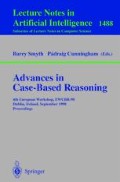Abstract
Abstract rules and specific fact situations interact in a highly complex fashion in engineering ethics, a weak analytic domain. In such domains, the construction of arguments or explanations does not rely on formal methods or proofs. Rather, experienced reasoners appear to address problems by applying ethical principles using a variety of techniques. In our study of a national engineering society's set of engineering ethics cases decided by an ethical review board, we have identified a number of operationalization techniques which help to fill the gap between abstract principles and specific case facts and which help to analyze new problems. Our goal is to develop a computational model that is capable of retrieving and applying operationalizations for the purpose of making accurate predictions of the facts, principles, and past cases that would be regarded as important in the analysis of new cases. In this paper, we present a preliminary design of such a model and outline an experiment to test it. We expect to make a contribution to interpretive case-based reasoning (CBR) by shedding light on the role of principles in decision making, by investigating the connection between abstract rules and concrete facts, and by testing the feasibility of using detailed, factual chronologies to represent cases.
Preview
Unable to display preview. Download preview PDF.
References
Allen, J. (1983). Maintaining Knowledge about Temporal Intervals, In the Communications of the ACM, 26(11): 832–843.
Ashley, K. D. and McLaren, B. M. (1995). Reasoning with Reasons in Case-Based Comparisons. In the Proceedings From the First International Conference on Case-Based Reasoning, Portugal.
Branting, L. K. (1994). A Computational Model of Ratio Decidendi. In Artificial Intelligence and Law 2: 1–31. Kluwer Academic Publishers. Printed in the Netherlands.
Branting, L. K. (1991). Building Explanations from Rules and Structured Cases. In International Journal of Man-Machine Studies, 34 (6): 797–837.
Forbus, K. D., Gentner, D. and Law, K. (1994). MAC/FAC: A Model of Similarity-based Retrieval. In Cognitive Science 19, 141–205.
Gentner, D. (1983). Structure-mapping: A Theoretical Framework for Analogy. In Cognitive Science 7, 155–170.
Golding, A. R. (1991). Pronouncing Names By a Combination of Rule-Based and Case-Based Reasoning. Ph.D. Dissertation, Stanford University.
Harris, C. E., Pritchard, M. S., and Rabins, M. J. (1995). Engineering Ethics: Concepts and Cases. Wadsworth Publishing Company, Belmont, CA.
Holyoak, K. I. and Thagard, P. (1995). Mental Leaps: Analogy in Creative Thought. The MIT Press, Cambridge, Massachusetts.
Jonsen A. R. and Toulmin S. (1988). The Abuse of Casuistry: A History of Moral Reasoning. University of CA Press, Berkeley.
Keane, M., Ledgeway, T. and Duff, S. (1994). Constraints on Analogical Mapping: A Comparison of Three Models. In Cognitive Science 18, 387–438.
Kolodner, J. (1993). Case-Based Reasoning. Morgan Kaufmann Publishers, Inc., San Mateo, CA.
McLaren, B. M. and Ashley, K. D. (1995). Case-Based Comparative Evaluation in TRUTH-TELLER. In the Proceedings From the Seventeenth Annual Conference of the Cognitive Science Society.
NSPE (1958–1996). Opinions of the Board of Ethical Review, Volumes I through VII and the NSPE Ethics Reference Guide. Published by the National Society of Professional Engineers, Alexandria, Virginia.
Rissland, E. L., Skalak, D. B., and Friedman, M. T. (1996a). BankXX: Supporting Legal Arguments through Heuristic Retrieval. In Artificial Intelligence and Law 4: 1–71. Kluwer Academic Publishers. Printed in the Netherlands.
Rissland, E. L., Skalak, D. B., and Friedman, M. T. (1996b). Evaluating a Legal Argument Program: The BankXX Experiments. Technical Report, CMPSCI TR95-30, Department of Computer Science, University of Massachusetts, Amherst, MA.
Rissland, E. L. and Skalak, D. B. (1991). CABARET: Statutory Interpretation in a Hybrid Architecture. In International Journal of Man-Machine Studies, 34 (6): 839–887.
Strong, C. (1988). Justification in Ethics. In Baruch A. Brody, editor, Moral Theory and Moral Judgments in Medical Ethics. Kluwer Academic Publishers, Dordrecht.
Author information
Authors and Affiliations
Editor information
Rights and permissions
Copyright information
© 1998 Springer-Verlag Berlin Heidelberg
About this paper
Cite this paper
McLaren, B., Ashley, K. (1998). Exploring the dialectic between abstract rules and concrete facts: Operationalizing principles and cases in engineering ethics. In: Smyth, B., Cunningham, P. (eds) Advances in Case-Based Reasoning. EWCBR 1998. Lecture Notes in Computer Science, vol 1488. Springer, Berlin, Heidelberg. https://doi.org/10.1007/BFb0056320
Download citation
DOI: https://doi.org/10.1007/BFb0056320
Published:
Publisher Name: Springer, Berlin, Heidelberg
Print ISBN: 978-3-540-64990-8
Online ISBN: 978-3-540-49797-4
eBook Packages: Springer Book Archive

